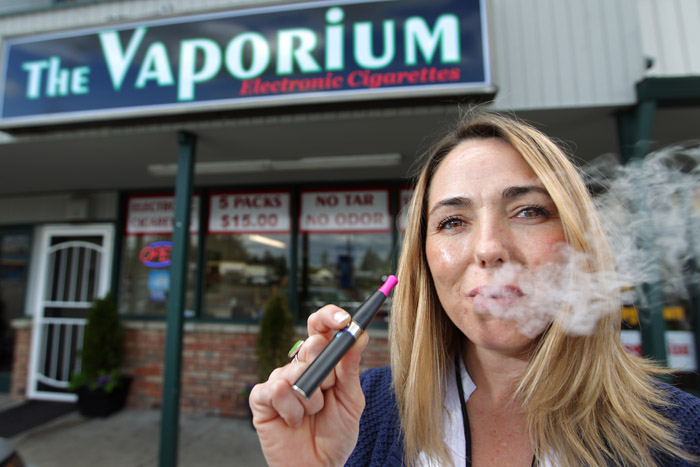RICHMOND, Va.— Cigarette maker Philip Morris International Inc. has purchased the rights to a technology that lets users inhale nicotine without smoking.
The world’s largest nongovernmental cigarette seller told The Associated Press today it has bought the patent for an aerosol nicotine-delivery system developed by Jed Rose, director of the Center for Nicotine and Smoking Cessation Research at Duke University in Durham, N.C. The school does not have a role in Rose’s agreement with the company and won’t receive any money. Terms were not disclosed.
“By avoiding the burning process altogether, finding a way of giving smokers nicotine to inhale but without those toxic substances that we can reduce the death and disease associated with smoking,” said Rose, who led the initial studies in the early 1980s that helped pave the way for commercial nicotine patches as a smoking cessation treatment.
“Hopefully it’s a wave of the future that inhaling combusted, burning tobacco will someday be a thing of the past.”
Rose said the next step is for Philip Morris International, with offices in New York and Lausanne, Switzerland, to develop a commercial product using the technology. The system differs from current medicinal nicotine inhalers available on the market as stop-smoking aids because it delivers nicotine more rapidly to mimic the nicotine “hit” a cigarette provides smokers.
“The other methods of delivering nicotine fall short of providing smokers with the satisfaction that they crave,” Rose said.
The move is an “important step in our efforts to develop products that have the potential to reduce the risk of smoking-related diseases,” Doug Dean, Philip Morris International’s senior vice president for research and development, said in a statement.
Spokesman Peter Nixon said it may take three to five years to develop a commercial product that would be considered an alternative to conventional cigarettes.
Its shares rose 93 cents, or more than 1 percent, to $70.42 in afternoon trading.
Today’s announcement is the latest in a series of steps by tobacco companies to venture into smokeless tobacco and other nicotine products as tax increases, health concerns, smoking bans and stigma cut into demand for cigarettes.
Last month, British American Tobacco PLC created a subsidiary called Nicoventures focused on nicotine alternatives. In 2009, the nation’s second-largest tobacco company Reynolds American Inc. purchased Swedish company Niconovum whose nicotine gum, pouches and spray help people stop smoking.
“We know that people smoke for the nicotine and die from the smoke,” said David Sweanor, a Canadian law professor and tobacco expert who consults with companies and others on industry issues. The question becomes, “can you give them the nicotine without the smoke in some way that’s consumer acceptable.”
The U.S. Food and Drug Administration is developing guidelines for companies interested in developing what the agency calls modified-risk tobacco products.
“Changes in the regulatory systems are creating an environment where competitive forces will move this market quite dramatically,” Sweanor said.
Nearly 6 million people die from tobacco use each year, from both direct use and secondhand smoke, according to the World Health Organization.
Philip Morris International, smaller only than state-controlled China National Tobacco Corp., was spun off from Richmond, Va.-based Altria Group Inc. in March 2008. Altria, owner of the nation’s largest tobacco company, Philip Morris USA, still sells Marlboro and other brands in the U.S.
Send questions/comments to the editors.



Success. Please wait for the page to reload. If the page does not reload within 5 seconds, please refresh the page.
Enter your email and password to access comments.
Hi, to comment on stories you must . This profile is in addition to your subscription and website login.
Already have a commenting profile? .
Invalid username/password.
Please check your email to confirm and complete your registration.
Only subscribers are eligible to post comments. Please subscribe or login first for digital access. Here’s why.
Use the form below to reset your password. When you've submitted your account email, we will send an email with a reset code.